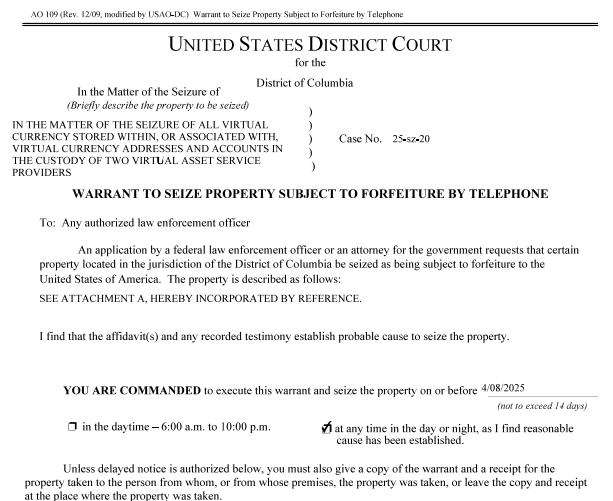The U.S. Department of Justice (DOJ) has announced the seizure of over $200,000 in cryptocurrency linked to Hamas, in a move that underscores growing federal efforts to dismantle terrorist financing networks operating through digital assets.
In a March 27 statement, the DOJ confirmed the confiscation of $201,400 in crypto, tracing the funds to a network of fundraising wallets controlled by Hamas. The wallets had allegedly been used to launder over $1.5 million in digital currencies since October 2024.
The DOJ said that Hamas-linked actors relied on a series of virtual currency exchanges, over-the-counter (OTC) brokers, and suspected financiers to conceal the origin and destination of the assets. At least 17 wallets were involved in the transactions.

This marks a significant escalation in the U.S. government’s response to crypto-enabled terror financing, following years of growing concern over how decentralized finance tools can be exploited by sanctioned or extremist entities.
Sanctions and Lawsuits Mount Against Crypto Facilitators
The announcement follows a string of global sanctions earlier this year. In January 2024, the U.S. Treasury’s Office of Foreign Assets Control, alongside its counterparts in the UK and Australia, imposed penalties on networks facilitating Hamas’ use of crypto. These were built upon earlier sanctions issued in October 2023.
Legal consequences have also begun to reach private platforms. In the same month, three families of victims from the October 2023 Hamas attack in Israel sued Binance and former CEO Changpeng Zhao, claiming the exchange had provided “substantial assistance” to the militant group. Binance denied the allegation, stating it had “no special relationship” with Hamas.
This lawsuit is set against a broader backdrop of U.S. enforcement actions against Binance, including a $4.3 billion settlement with the DOJ in November 2023 over deficiencies in anti-money laundering controls.
Crypto and Terrorism: A Limited but Monitored Vector
While the use of cryptocurrency by terrorist organizations has alarmed regulators, it remains relatively small in scale, according to a 2023 report by Chainalysis. The blockchain analytics firm found that the majority of terror financing still relies on traditional fiat-based systems.
Still, U.S. officials and lawmakers have flagged the potential for digital currencies to evade sanctions, obscure transactions, and enable cross-border transfers beyond regulatory reach.
A December 2024 Congressional Research Service report concluded that Hamas has been soliciting crypto donations since at least 2019, though the effectiveness of such campaigns remains under review.
What’s Next?
The latest seizure raises fresh questions about the balance between financial privacy and national security in the crypto space. Some lawmakers have argued for more stringent oversight of crypto platforms, particularly those operating internationally or offering non-KYC services.
As enforcement ramps up, the crypto industry may face tighter compliance expectations, especially around wallet tracking, on-chain monitoring, and suspicious transaction reporting.
Meanwhile, the DOJ’s action signals a clear message: digital assets are not beyond the reach of law enforcement, and bad actors who misuse them, regardless of ideology will be pursued with full legal force.





